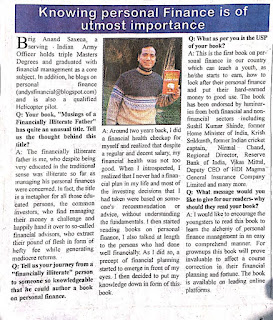Musing 35- Insurance The Essential Five: Health Insurance part 1
INSURANCE:
THE ESSENTIAL FIVE- PART 2
The
festival of lights- Diwali is over and I am sure you enjoyed the same with your
family and friends. In my case though, Diwali continues unabated with my book,
“Musings of a Financially Illiterate Father”, reaching new heights every day.
As on
02 Nov 2019, i.e. today, the book is ranked # 5 globally on Kindle (Business and
Finance) and # 12 on Amazon Books (Business Self-Help). It is an amazing and
humbling feat considering that there are nearly 1.5 million books published
each year and my book is now nearly 17 months old.
Very
clearly, common investors like me have found resonance with the book and have
given it a thumbs-up. Thank you all for your love, support and blessings.
We had
discussed the first of the essential five insurances- the life insurance, in my
last post. Let’s commence with our discussion on the remaining four insurances.
2. Health Insurance.
This
is the second most important insurance that one needs. In India, there are
various kinds of health insurance plans: individual plans, family floater
plans, maternity insurance plans, personal accident cover plans, critical
illness insurance plans and senior citizen plans. The thing to be remembered is
that as you age, you will be paying more and more for a health plan. In
general, buying a health cover after 40 years of age will be costlier. For a
family of six including two senior citizens, two adults under 40 and two
children, a 10-lakh health cover will cost around ₹25,000 per annum today.
The
factors to be considered for a health insurance plan follow.
• How much should be the ‘sum insured?’ In
a small town, an amount of 3-5 lakhs may suffice but, in a metro, 5-10 lakhs
may be a better figure to plan. Corporate health insurance is being offered by
many companies today. Its coverage must be factored in the calculations.
• The insurance plan must offer ‘lifetime
renewability’ as health-related expenses tend to rise with age and buying a new
plan will be prohibitive in terms of premium in middle or old age. This simply
means that you can keep renewing your health insurance coverage each year
irrespective of your age or ailments. This is mandated by the Insurance Regulatory
and Development Authority of India (IRDAI) and can’t be denied by the insurance
companies.
• Your policy must have a ‘top-up’ or
‘restore limit’ meaning that if you are afflicted with a critical illness which
requires an expenditure beyond the sum insured, that can be topped up by paying
an additional premium.
• Critically look for ‘sub-limits’ and
‘co-payment’ options in the plan which should be none or minimum. Sub-limits
mean that your insurer specifies a limit for an expense and anything above that
needs to be borne by you (co-payment). Room rent, diagnostics and doctor’s fees
are the most commonly introduced sub-limits.”
• Pre-existing diseases must be honestly
declared. Most Insurance companies have a waiting period for starting coverage
for pre-existing diseases, which may be between 2 and 5 years. Look for the minimum
waiting period and do disclose your existing ailments or else the insurance company
will retain the right to reject your claim.
• Day-care and OPD expenses must be
covered in the policy. Most insurance plans cater for only overnight admission
or minimum hospital admission of 24 hours. Many medical and surgical
procedures, however, require an admission of fewer than 24 hours, which will be
excluded by default by the insurance company.
I will
stop here for you to mull over this post and review your health cover. But,
hold your horses till next week when I update you on the latest changes brought
about by IRDA in the field of health insurance.
Till
that time enjoy my book, the link is below.



Health insurance is always important for the insurer, It covers all your medical expenses. Health insurance will helpful for you as well as your family. For more details.Term Life insurance
ReplyDelete